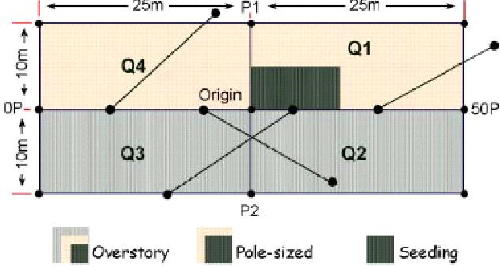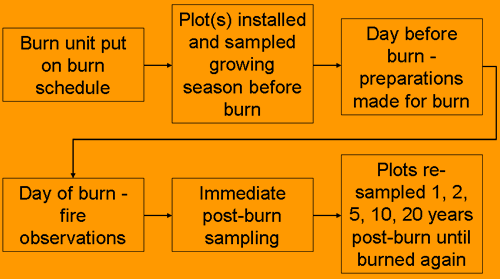


Standard protocols for monitoring the effects of prescribed fire on vegetation have been established and described in the National Park Service Fire Monitoring Handbook (FMH). National standards were created to facilitate information exchange among parks and guide long-term data collection.
We generally use three types of plots: grass, shrub, and forest. A grass plot is simply a 30-meter transect used to measure cover of herbaceous vegetation. In shrublands, a belt transect is added to measure shrub density. Forest plots are the most complex (see below). Vegetation cover is measured along one of the 50-meter transects, shrub and tree data are collected in belt transects, and fuel loading is measured along 4 transects (Brown's lines).

Monitoring Schedule
Plots are intended for long-term vegetation monitoring. Generally, plots are sampled before prescribed fire is applied to provide baseline information used to detect changes in post-fire vegetation. Here is the schedule that we follow for sampling, although this schedule may be altered if additional sampling is needed.

Here is a more complete list of the information we collect and when this information is collected:
Regular
plot visits (pre- and post-burn)
Cover of herbaceous species
Shrub density (shrub & forest plots)
Tree density and DBH (forest plots)
Fuel load (forest plots)
Plot photographs
Landscape photo points
Immediate
post-burn sampling*
Burn severity (substrate & vegetation)
% crown scorch, scorch height, char height (forest plots)
Fuel load (forest plots)
Plot photographs
* Sampled 1-2 days after fire on grass & shrub plots and 2-4 weeks after fire on forest plots
To see a more detailed description of our standard monitoring protocols, download the Fire Monitoring Handbook (2003).
Resource management objectives drive the fire effects monitoring program. Sometimes the standard protocols do not provide the type of information that is needed to determine if the fire management program is meeting objective set by resource management. In these instances, standard protocols are modified or alternative protocols are employed to provide the appropriate information.